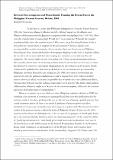Files in this item
Between postoccupation and postcolonial : framing the recent past in the Philippine treason amnesty debate, 1948
Item metadata
| dc.contributor.author | Lawson, Konrad M. | |
| dc.contributor.editor | von Lingen, Kerstin | |
| dc.date.accessioned | 2023-01-24T11:30:03Z | |
| dc.date.available | 2023-01-24T11:30:03Z | |
| dc.date.issued | 2017-08 | |
| dc.identifier | 243563961 | |
| dc.identifier | 17e5bc67-2293-4506-9aef-643e9d29722b | |
| dc.identifier | 000437520100006 | |
| dc.identifier | 85145747069 | |
| dc.identifier.citation | Lawson , K M 2017 , Between postoccupation and postcolonial : framing the recent past in the Philippine treason amnesty debate, 1948 . in K von Lingen (ed.) , Debating collaboration and complicity in war crimes trials in Asia, 1945-1956 . World Histories of Crime, Culture and Violence , Palgrave Macmillan , Cham , pp. 105-128 . https://doi.org/10.1007/978-3-319-53141-0_6 | en |
| dc.identifier.isbn | 9783319531403 | |
| dc.identifier.isbn | 9783319850740 | |
| dc.identifier.isbn | 9783319531410 | |
| dc.identifier.issn | 2730-9630 | |
| dc.identifier.other | ORCID: /0000-0002-0276-8078/work/79226858 | |
| dc.identifier.uri | https://hdl.handle.net/10023/26816 | |
| dc.description.abstract | The most extensive public debate on the moral dilemmas of life in the Japanese-occupied Philippines (1941–1945) took place between the first elected legislators of an independent Philippine republic in 1948 over whether to approve a partial presidential amnesty for wartime collaborators. The eventual approval of the amnesty brought an end to a struggling People’s Court system of trying treason cases, abandoned prosecutions for all accused political and economic collaborators, and transferred other cases of military collaboration and informers to regular criminal courts. The chapter explores some of the objections to the amnesty on the grounds of class discrimination that ultimately failed to persuade the majority but argues that, on all sides, participants saw the Philippine experience as deeply integrated in a broader global process of confronting the legacies of brutal foreign occupations. | |
| dc.format.extent | 24 | |
| dc.format.extent | 178001 | |
| dc.language.iso | eng | |
| dc.publisher | Palgrave Macmillan | |
| dc.relation.ispartof | Debating collaboration and complicity in war crimes trials in Asia, 1945-1956 | en |
| dc.relation.ispartofseries | World Histories of Crime, Culture and Violence | en |
| dc.subject | Philippines | en |
| dc.subject | Political Retribution | en |
| dc.subject | 20th century | en |
| dc.subject | History | en |
| dc.subject | Global history | en |
| dc.subject | D731 World War II | en |
| dc.subject | DS Asia | en |
| dc.subject | BDC | en |
| dc.subject | R2C | en |
| dc.subject | SDG 16 - Peace, Justice and Strong Institutions | en |
| dc.subject.lcc | D731 | en |
| dc.subject.lcc | DS | en |
| dc.title | Between postoccupation and postcolonial : framing the recent past in the Philippine treason amnesty debate, 1948 | en |
| dc.type | Book item | en |
| dc.contributor.institution | University of St Andrews. Centre for Minorities Research (CMR) | en |
| dc.contributor.institution | University of St Andrews. Institute of Legal and Constitutional Research | en |
| dc.contributor.institution | University of St Andrews. School of History | en |
| dc.identifier.doi | https://doi.org/10.1007/978-3-319-53141-0_6 | |
| dc.identifier.url | https://www.palgrave.com/gp/book/9783319531403 | en |
This item appears in the following Collection(s)
Items in the St Andrews Research Repository are protected by copyright, with all rights reserved, unless otherwise indicated.

